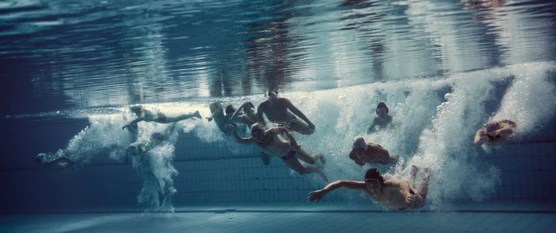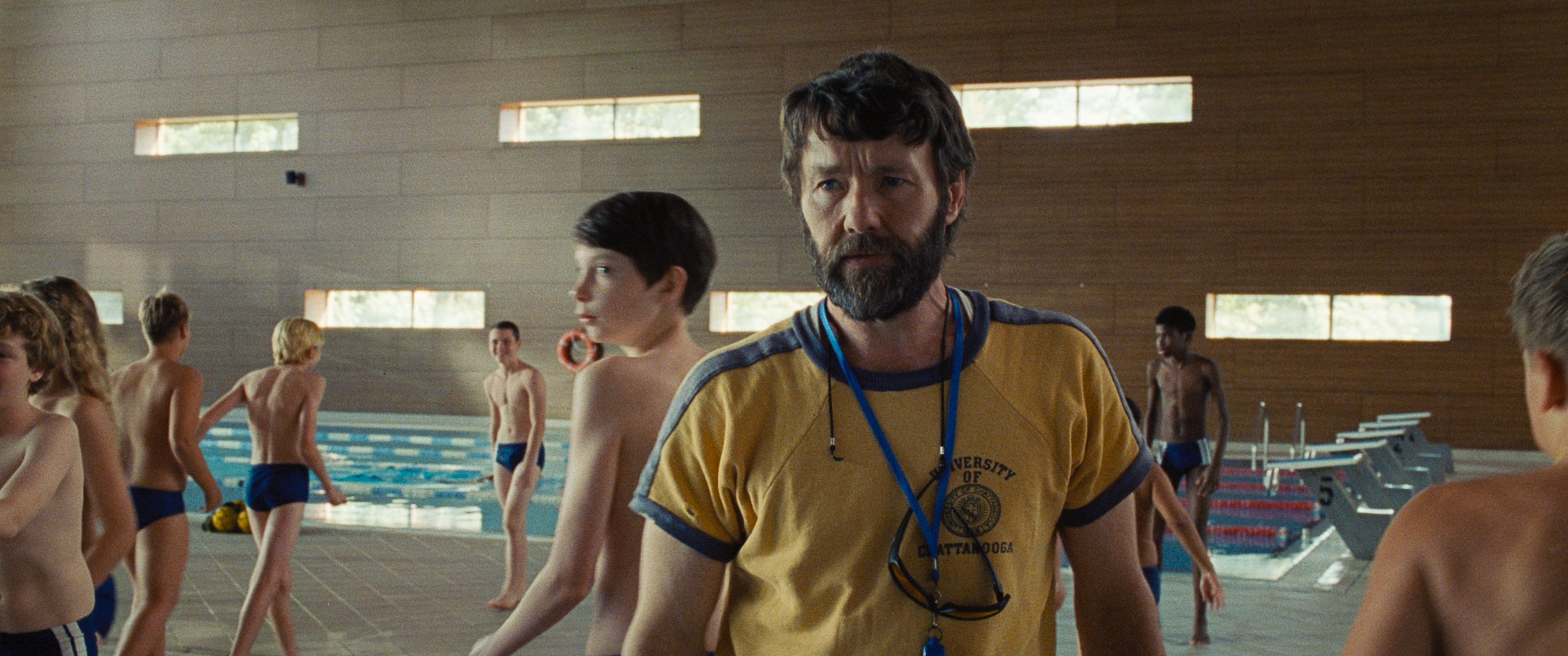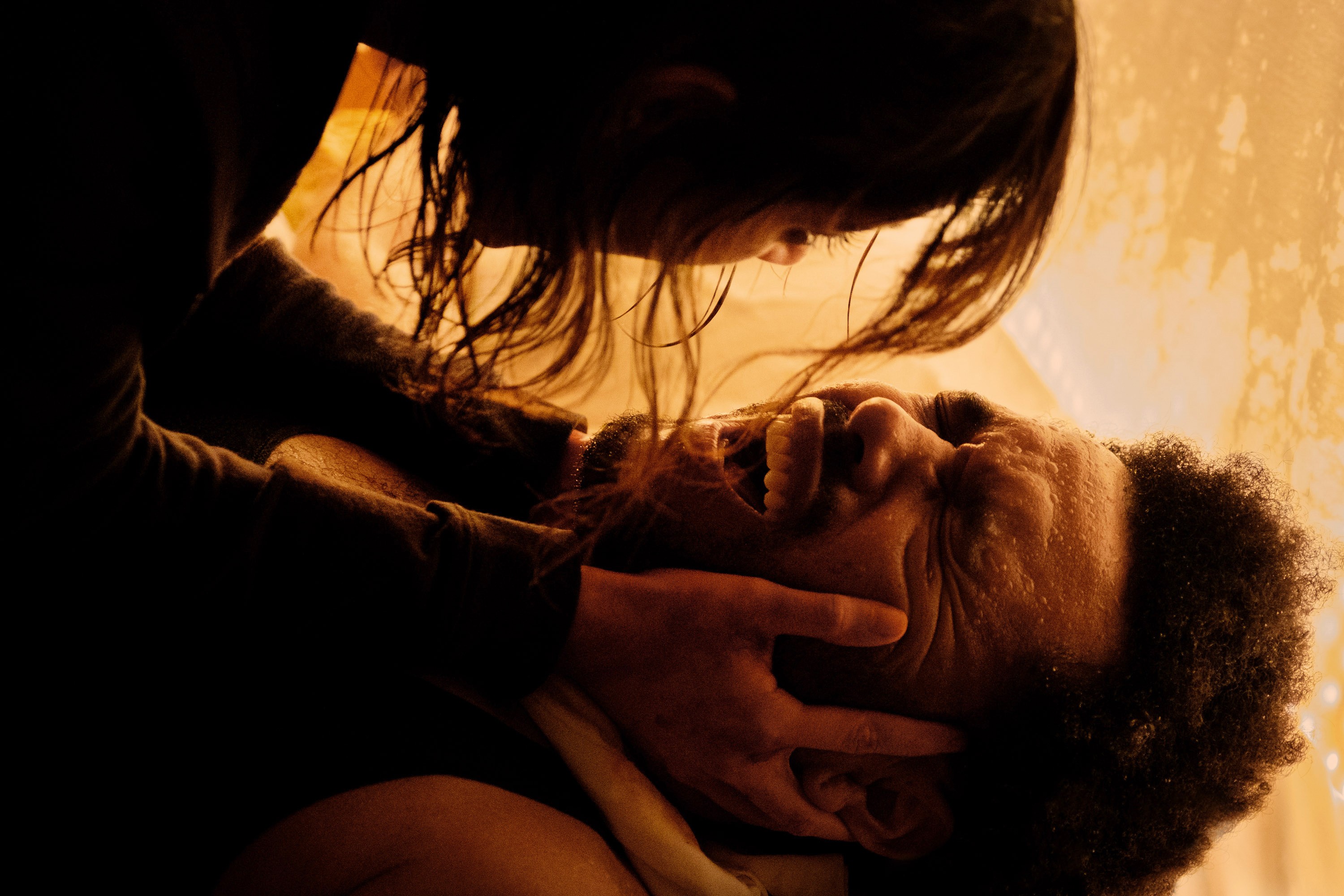
The experience of engaging with a film can give you a reference for expressing a personal idea that you didn’t previously have the words for. This transference makes a moot point of all criticisms that could reasonably be leveled at the film. What do flaws matter, when you walk out of the cinema knowing how to finally say something you’ve been yearning to say? “The Plague” is full of ideas executed with varying degrees of resonance. It is not for everyone. But it could mean a lot to people like me.
In his debut feature, filmmaker Charlie Polinger plays with broad riffs on coming-of-age, body horror, and bullying genres before paring these themes back to reveal that two 12-year-old boys — and their contrasting approaches to being different — are really the heartfelt preoccupation of the film.
Set in the sealed world of a water polo training camp for boys during the summer of 2003, “The Plague” is both stylized and ascetic. Big, bold swings in the visual language and sound design department alternate with stillness and silence. This interplay between sensual overwhelm and sudden loneliness reflects the condition that watchful newbie Ben (Everett Blunck) feels as he processes the stressful social rules that may lead to his ostracization.
Shot on 35mm by cinematographer Steve Breckton, the intention to create a striking, mysterious, and uneasy atmosphere is evident from the first frame. We begin underwater, below the surface of a swimming pool. The surface is broken as a body cannonballs down to the bottom, followed by a second, a third, a fourth, a fifth … until there are too many to track.
This introduction to a group of 12- and 13-year-old boys as faceless forces of nature will prove apt in certain ways, although Polinger is careful not to make any of them one-dimensional. While there are echoes of “Lord of the Flies” in the society these boys make for themselves — especially in terrifying and smart ringleader Jake (Kayo Martin) — shifts in perspectives and comic vignettes mean that “The Plague” never settles into one groove. It flirts with being a more cruel story than it is; indeed, Polinger’s control over his core interest creates intrigue as we wonder, to paraphrase Richard Ayoade in “The Souvenir Part II,” if he will resist the temptation to be obvious.
We are aligned to the perspective of a new boy at camp, Ben. Their coach (Joel Edgerton in athleisure) is the only adult authority and it quickly becomes clear that he’s out of his depth. In the aftermath of a training session, individual boys yell out brash comments and the camera cuts quickly between close-ups of each face, reframing this post-swim conversation as a site of intense pressure. Why is this lawless brood so undersupervised? Departures from realism in service of heightening the dynamics (when you’re a kid trying to fit in, it feels like there are no adults around) require the viewer to accept the film on its assured word, rather than interrogating its rules.

Two boys emerge as the poles that Ben uses to orient himself. There is Jake, the perma-grinning, smart-mouthed group leader. There is Eli (Kenny Rasmussen) an autistic-coded kid who, Ben is told, has “the plague.” “Those are not regular pimples, those are plague pimples,” says Jake, as he gives Ben the lowdown on the game that no one can afford to opt out of entirely. Touching Eli means you have to wash yourself immediately, otherwise you will have the plague too. The spectacle of the boys fleeing every time Eli nears them, or washing furiously after a skin brush, is painful to behold, however, Eli is not defined by his victimhood. He is a full person with interests that range from dancing to Gollum impersonations to creating fake blood and pretending to cut off his own finger to psyche Ben out.
While he serves as a cautionary tale to Ben, he also serves as an irresistible source of fascination. Slowly, the film absorbs us in the existential question of who Ben is going to be. Will he side with the dominant tribe and freeze out Eli to fit in? Or will be openly friends with Eli and risk making himself as much of a target? Is anyone mentally strong enough at 12 to weather living with tormentors?
With a score that includes staccato human voices crying out, Ben moves through the sterile indoor world of a leisure center, often resembling a lonely gunslingers thanks to the Widescreen aspect ratio. Despite his solitude, there’s always a chance that he might be being watched, and Jake has a strange way of knowing exactly when he’s been spending time with Eli. The claustrophobia of having no privacy while having no company is evoked to create a pressure cooker environment where violence might erupt at any moment.

The plague itself is teased as both a real and metaphorical construct. There are shades of Julia Ducournau’s own debut feature “Raw” in a skin-bubbling rash, while several visceral watch-through-the-finger moments blur the line between psychological and physical bloodshed. All creative choices are tailored to center a social-identity crisis and a climactic confrontation lays out what the stakes have been for Ben all along. This is a deeply emotional film in high concept clothing, coded to resonate with those of us well-versed in the instinct to betray ourselves in order to be accepted.
One read on the relationship between Ben and Eli is that it’s a relationship between a masked neurodivergent boy and an unmasked one. This is a dynamic I have never seen before that speaks to my own inter-tribe struggles as I — diagnosed as an adult — sometimes resent those open and at ease with their differences. The biggest reveal of “The Plague” is that Eli — not in a “magical autistic” way, but in a subtle humanist way — has something to teach Ben.
This is a film that harnesses its many offbeat and potent powers in service of a unique strain of reassurance. I left feeling lighter and more able to unmask.
Grade: B+
“The Plague” premiered at the 2025 Cannes Film Festival. It is currently seeking U.S. distribution.
Want to stay up to date on IndieWire’s film reviews and critical thoughts? Subscribe here to our newly launched newsletter, In Review by David Ehrlich, in which our Chief Film Critic and Head Reviews Editor rounds up the best new reviews and streaming picks along with some exclusive musings — all only available to subscribers.



